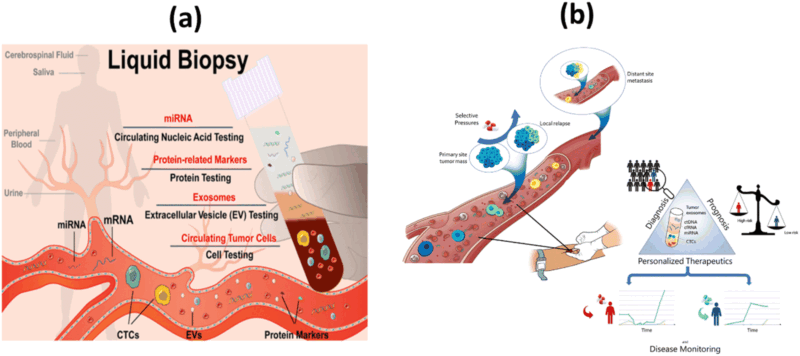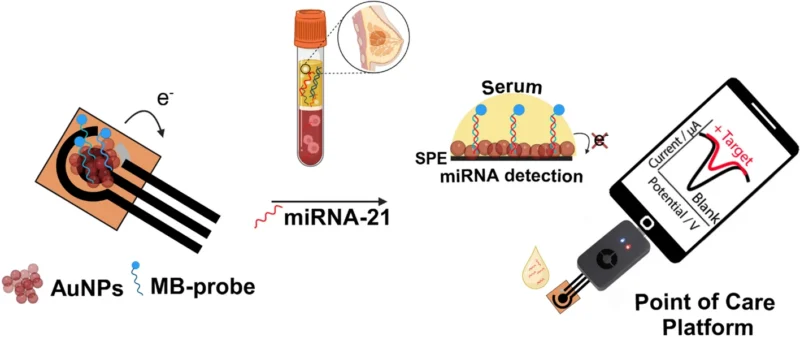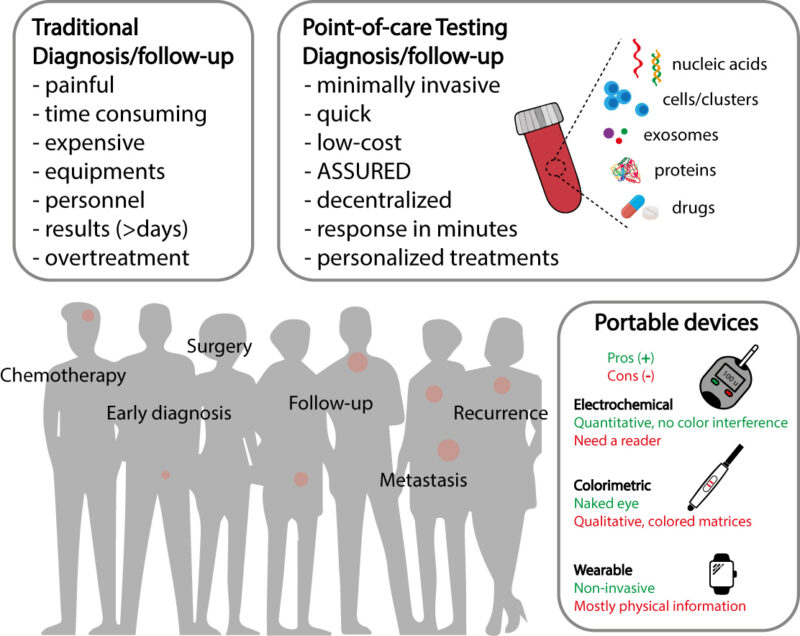In the rapidly evolving landscape of oncology, liquid biopsy has emerged as a transformative approach for cancer management, including early diagnosis, monitoring and prognosis. Unlike traditional tissue biopsies, liquid biopsy relies on the analysis of tumor-derived components, e.g., circulating tumor cells (CTCs), cell-free DNA (cfDNA), extracellular vesicles (EVs), proteins, and microRNAs (miRNAs), from easily accessible biological fluids like blood, saliva, urine, etc. The integration of point-of-care (PoC) technologies into this paradigm might offer unprecedented opportunities to bring cancer diagnostics closer to patients, enabling faster decision-making and broader clinical accessibility.

Figure 1. Simplified representation of liquid biopsy and the concept and clinical applications of liquid biopsy in tumor management (from the paper published in Lab on a Chip, (2023)
A crucial leap forward in this direction involves the convergence of electrochemical sensing, paper-based diagnostics, and multivariate analysis to realize portable, low-cost, and multiplexed PoC platforms for liquid biopsy, for the use of non-specialists. These tiny devices not only provide accurate and rapid biomarker detection but also mitigate the logistical and economic limitations of centralized diagnostic laboratories. In particular, recent research highlights the critical role of miRNA-signature as stable and informative biomarkers for cancer.
Their resistance to degradation and specificity to tumor subtypes make them ideal targets for PoC detection. Devices developed for miRNA quantification have demonstrated clinical relevance in early cancer screening and therapy monitoring. Clinical trials, such as BIOMILD and ANDROMEDA, have shown that miRNA profiling can effectively stratify cancer risk and predict treatment outcomes. This positions miRNA-based liquid biopsy as a cornerstone for personalized oncology.
A key contribution in this domain comes from the Uninanobiosensors laboratory at the Department of Pharmacy of the University of Naples Federico II. Our research group has advanced several platforms for PoC cancer diagnostics, with a focus on the detection of therapeutic miRNA signatures, exosomes and protein biomarkers. By leveraging nanomaterial-enhanced electrochemical sensors and paper-based analytical devices (PADs), we aim to deliver sustainable and accessible tools for oncologists and clinical researchers alike.
Among our notable developments is the design of multiplexed paper-based platforms capable of detecting miRNA-21 and miRNA-105—biomarkers linked to metastasis—with high sensitivity, even in complex biological fluids. These devices are particularly promising for resource-limited settings, where traditional diagnostic infrastructure is often lacking. Our work not only reduces diagnostic costs but also minimizes sample volumes, eliminates the need for cold-chain storage, and enables results visualization by naked eye or smartphone-based readout.

Figure 2. Schematic representation for the PoC platform for detection of miRNA 21 in TNBC (from the paper published in Discover Oncology, (2025) Moreover, the OncoCheck conceptual framework, introduced in recent literature, envisions the integration of liquid biopsy with PoC testing and AI analytics to form a unified, cloud-connected diagnostic model. This approach holds strong potential to democratize cancer screening and follow-up, especially across low- and middle-income countries (LMICs), where up to 70% of cancer cases are diagnosed at advanced stages due to infrastructural barriers.

Figure 3. lllustration of the challenges and solutions associated with early cancer detection and treatment. The first part of the image highlights the existing challenges based on pathological conditions and conventional techniques. The second part proposes a liquid biopsy POCT, and AI-integrated system named “OncoCheck” to address these challenges. The OncoCheck platform aims to ensure timely and equitable accessible diagnostics for all (from the paper published in Cancer and Metastasis Review, (2025)
In practical terms, PoC liquid biopsy platforms can benefit clinicians in real-time treatment decisions, enhance clinical trial stratification, and support decentralized monitoring in at-home care models,empowering the concept of precision medicine. They are not merely diagnostic devices, but essential components of a broader strategy for equitable, precision-driven oncology.
As we look ahead, fostering collaborations between researchers, clinicians, and policymakers is critical to ensure the widespread implementation of these technologies. Standardization, validation across diverse cohorts, and integration into healthcare systems remain essential milestones. However, the foundation is solid: PoC liquid biopsy, empowered by paper-based diagnostics and guided by molecular biomarkers, is reshaping the frontiers of cancer care, one drop of blood at a time.
Prof. Dr. Stefano Cinti
Head of Uninanobiosensors Lab
Department of Pharmacy, University of Naples Federico II, Italy


